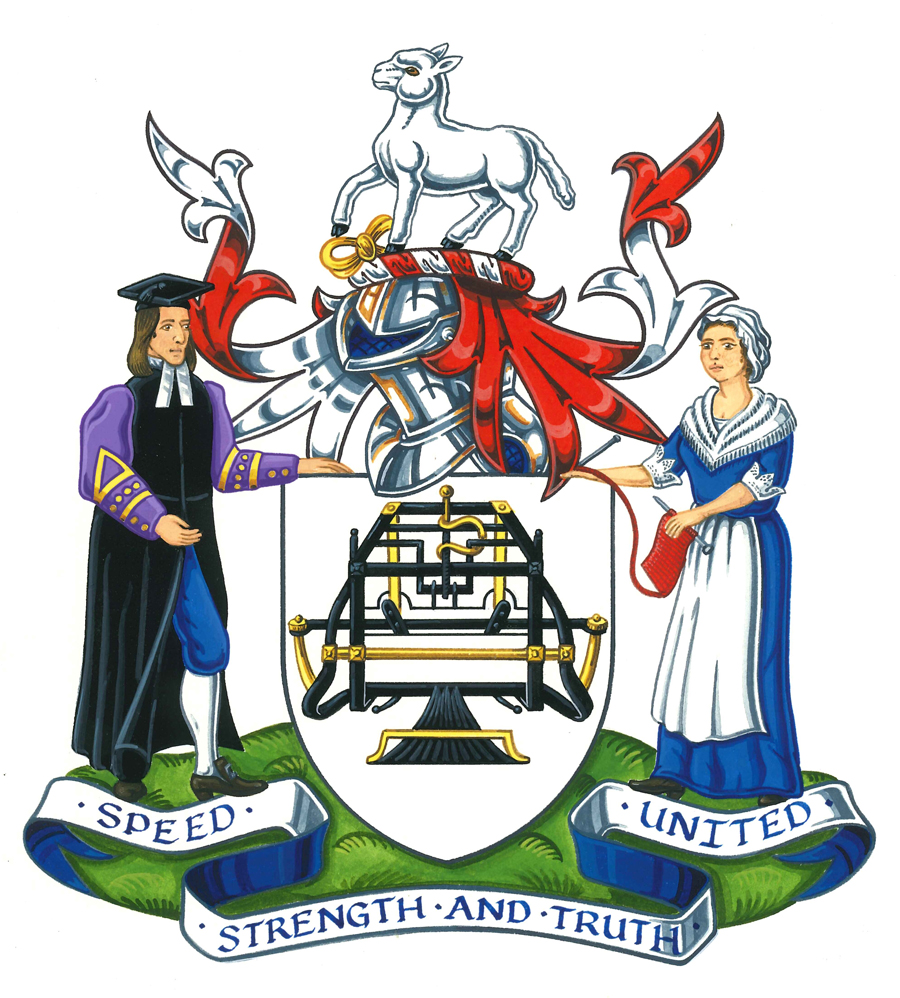The Worshipful Company of Framework Knitters
James Lee returned to London in 1612. He brought seven framework knitters and eight frames with him and set up a small industry. Workers and their apprentices gradually created rules by which the industry and the prices charged could be controlled.

Livery of the current 'Company'.
The quality of knitted goods produced by framework knitters was widely recognised and by 1655, more of their stockings were sold abroad than in London.
A charter from Cromwell
Concerned at the threat of overseas competition, the group petitioned Oliver Cromwell for a charter of incorporation to regulate and protect the trade. In 1657 the Company received its charter. A Company seal indicated the quality of goods produced by members and prevented members from taking foreign apprentices. To avoid conflict with the East Midlands industry, the charter applied specifically to the silk knitting industry within London and the four miles around the City. Membership of the Company was, however, open to framework knitters beyond the four mile zone.
A new charter and powers
A new charter was obtained from Charles II in 1663. Framework knitters from all branches, not just silk, were now required to register with the Company within three months of entering the trade, if they lived within 20 miles of London, or within six months if they lived beyond 20 miles. Failure to register incurred a fine of £5 for every week beyond the limit. Individuals could not enter the trade unless they had served a seven year apprenticeship with an authorised master. Masters were only allowed to take on a maximum of two apprentices at one time.
Export of knitting machines was a particular concern of the Company because it provided overseas competition with access to English technology and potentially jeopardised the future of the English knitting industry. To deal with the matter, the Company secured the power to seize machines they thought were being prepared for export.
Deputies were appointed by the Company in knitting districts such as Nottingham, Hinckley and Leicester to police the industry and ensure that its byelaws were enforced. Quarterly courts of representatives were held in districts to admit apprentices, and to prosecute those breaking the Company's laws.
Rejecting the Company
The Company's powers were met with a mixed response. Whilst it protected those already in the trade from further people entering the industry, it did not help hosiers looking to expand and find more workers. Gradually complaints built up from members who resented expenditure on ceremonial items and the Company's hall whilst some members struggled to make a living. The payment of fees to register apprentices became another issue of conflict. Provincial hosiers began to boycott the Company and ignore the apprenticeship control system. In 1730 two dozen Nottingham hosiers came together to challenge the authority of the Company. A case was eventually brought by the Company against John Cartwright, a Nottingham hosier, who refused to pay the eight shilling charge for each indenturing of an apprentice. The Company lost the case. Following this disastrous outcome for the Company, the deputies in Nottingham, Leicester and Hinckley resigned from their posts realising that the Company had no power to enforce its rules. An attempt was made in 1745 to revive the Company, but without success, and its role became purely social.
Worshipful Company of Framework Knitters
The Worshipful Company of Framework Knitters was incorporated on 13 June 1657 by Oliver Cromwell.